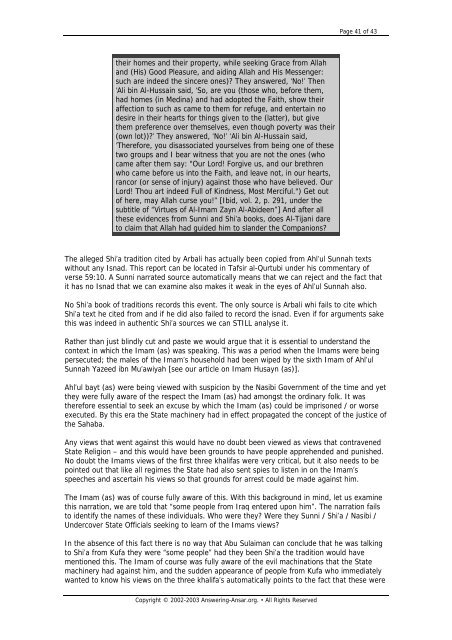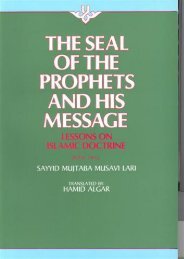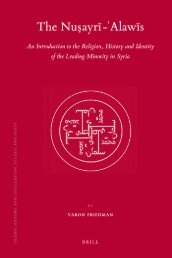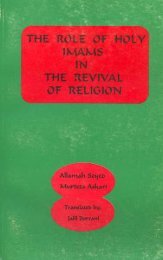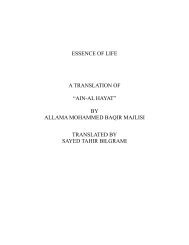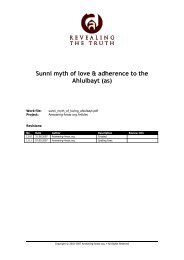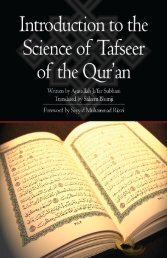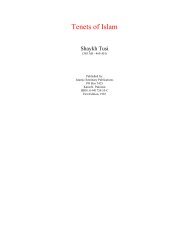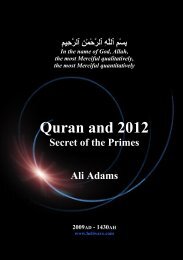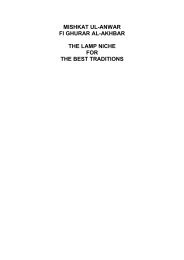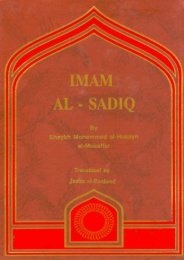Who really killed ‘Uthman?
Who really killed 'Uthman - Knowledge
Who really killed 'Uthman - Knowledge
- No tags were found...
You also want an ePaper? Increase the reach of your titles
YUMPU automatically turns print PDFs into web optimized ePapers that Google loves.
Page 41 of 43<br />
their homes and their property, while seeking Grace from Allah<br />
and (His) Good Pleasure, and aiding Allah and His Messenger:<br />
such are indeed the sincere ones)? They answered, ‘No!’ Then<br />
‘Ali bin Al-Hussain said, ‘So, are you (those who, before them,<br />
had homes (in Medina) and had adopted the Faith, show their<br />
affection to such as came to them for refuge, and entertain no<br />
desire in their hearts for things given to the (latter), but give<br />
them preference over themselves, even though poverty was their<br />
(own lot))?’ They answered, ‘No!’ ‘Ali bin Al-Hussain said,<br />
‘Therefore, you disassociated yourselves from being one of these<br />
two groups and I bear witness that you are not the ones (who<br />
came after them say: "Our Lord! Forgive us, and our brethren<br />
who came before us into the Faith, and leave not, in our hearts,<br />
rancor (or sense of injury) against those who have believed. Our<br />
Lord! Thou art indeed Full of Kindness, Most Merciful.") Get out<br />
of here, may Allah curse you!” [Ibid, vol. 2, p. 291, under the<br />
subtitle of “Virtues of Al-Imam Zayn Al-Abideen”] And after all<br />
these evidences from Sunni and Shi’a books, does Al-Tijani dare<br />
to claim that Allah had guided him to slander the Companions?<br />
The alleged Shi’a tradition cited by Arbali has actually been copied from Ahl’ul Sunnah texts<br />
without any Isnad. This report can be located in Tafsir al-Qurtubi under his commentary of<br />
verse 59:10. A Sunni narrated source automatically means that we can reject and the fact that<br />
it has no Isnad that we can examine also makes it weak in the eyes of Ahl’ul Sunnah also.<br />
No Shi’a book of traditions records this event. The only source is Arbali whi fails to cite which<br />
Shi’a text he cited from and if he did also failed to record the isnad. Even if for arguments sake<br />
this was indeed in authentic Shi’a sources we can STILL analyse it.<br />
Rather than just blindly cut and paste we would argue that it is essential to understand the<br />
context in which the Imam (as) was speaking. This was a period when the Imams were being<br />
persecuted; the males of the Imam’s household had been wiped by the sixth Imam of Ahl’ul<br />
Sunnah Yazeed ibn Mu’awiyah [see our article on Imam Husayn (as)].<br />
Ahl’ul bayt (as) were being viewed with suspicion by the Nasibi Government of the time and yet<br />
they were fully aware of the respect the Imam (as) had amongst the ordinary folk. It was<br />
therefore essential to seek an excuse by which the Imam (as) could be imprisoned / or worse<br />
executed. By this era the State machinery had in effect propagated the concept of the justice of<br />
the Sahaba.<br />
Any views that went against this would have no doubt been viewed as views that contravened<br />
State Religion – and this would have been grounds to have people apprehended and punished.<br />
No doubt the Imams views of the first three khalifas were very critical, but it also needs to be<br />
pointed out that like all regimes the State had also sent spies to listen in on the Imam’s<br />
speeches and ascertain his views so that grounds for arrest could be made against him.<br />
The Imam (as) was of course fully aware of this. With this background in mind, let us examine<br />
this narration, we are told that “some people from Iraq entered upon him”. The narration fails<br />
to identify the names of these individuals. <strong>Who</strong> were they? Were they Sunni / Shi’a / Nasibi /<br />
Undercover State Officials seeking to learn of the Imams views?<br />
In the absence of this fact there is no way that Abu Sulaiman can conclude that he was talking<br />
to Shi’a from Kufa they were “some people” had they been Shi’a the tradition would have<br />
mentioned this. The Imam of course was fully aware of the evil machinations that the State<br />
machinery had against him, and the sudden appearance of people from Kufa who immediately<br />
wanted to know his views on the three khalifa’s automatically points to the fact that these were<br />
Copyright © 2002-2003 Answering-Ansar.org. • All Rights Reserved


